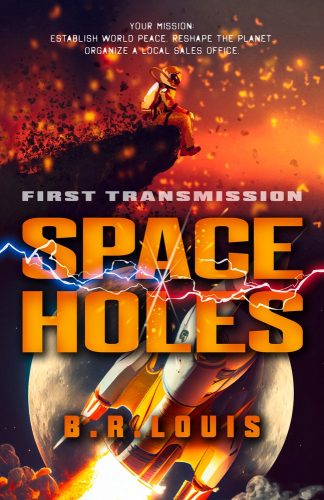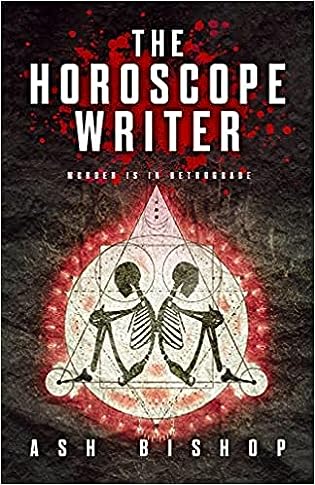 Space Holes (First Transmission, #1) by B.R. Louis
Space Holes (First Transmission, #1) by B.R. Louis Format: eARC
Source: supplied by publisher via Edelweiss
Formats available: hardcover, paperback, ebook, audiobook
Genres: farce, humor, parody, satire, science fiction, space opera
Series: Space Holes #1
Pages: 302
Published by CamCat Books on March 26, 2024
Purchasing Info: Author's Website, Publisher's Website, Amazon, Barnes & Noble, Kobo, Bookshop.org, Better World Books
Goodreads
Saving an alien planet is nothing compared to meeting your sales quota. Marcus Aimond, untrained tag-along aboard humanity's first intergalactic exploratory commerce vessel, has a singular sell off-brand misprinted merchandise. When the rookie and his crew encounter the Nerelkor, a frog-like civilization, he is thrust head-first into an alien civil war. The opposing factions, Rejault and Dinasc, are stuck in an ill-fated feud driven by deep-rooted ineptitude. To avoid the planet’s total annihilation and establish a local sales office, Aimond and the crew must survive arena combat, reshape the very structure of the planet, establish world peace, and stay alive―for the sake of positive branding, of course.
My Review:
I’m writing this review because I desperately need to get this book out of my head. Which means that, fair warning and abandon all hope ye who enter here, this is going to be an absolute RANT of a review.
Which is really too bad because it had a lot of potential. It’s just that all that potential turned out to be added cereal filler.
I mean that literally. You’ll see.
At first, I thought the title was a pun, that ‘Space Holes’ was meant to be a play on ‘Ass Holes’ without literally giving the book the title ‘Ass Holes’. Having read it, I think that would have been a better book.
Instead, the ‘Space Holes’ of the title are wormholes, or at least one stable wormhole near Jupiter. The reason that those wormholes are not officially called wormholes in any of the promotional or merchandising brochures created by the company that owns the trademark on the term ‘Space Holes’ is that ‘wormhole’ is a word in common parlance that can’t be trademarked.
At that point, the joke was still funny but was starting to wear a bit thin. You’re wondering what the joke was, right?
The joke was that this is set in a not-too-far-distant future where a cereal company that makes really bad but ridiculously addictive cereal has taken over the entire world (except for Florida which is also part of the joke) and is desperate to find new markets for their terrible cereal and all of the cheap tchotchkes they use to market their terrible cereal and that the terrible cereal is intended to market. Yes, it’s the circle of advertising life, and yes, it really happens and yes it can be funny.
Which leads to the building of a spaceship intended to traverse that ‘Space Hole’ to another galaxy in order to set up new branch offices and sell yet more cereal and all of the many, many toys and other cheap products that fund the company’s executive offices and, at this point, the entire world government.
And it kind of was, up to a point of saturation.
Where the joke started to get thin, at least for this reader, was the point where the crew of the ship got trained, not even in simulators, but through a limited series of a mere EIGHT 45-minute point-and-click web-based training videos. It’s not a surprise that they crash-land on the first planet they find, it’s more of a surprise that they don’t crash into the sides of the wormhole.
Don’t even think that the ship has safety protocols designed to prevent such an occurrence, because it doesn’t. Have safety protocols, that is. Safety was sacrificed for cost-cutting and/or greater merchandising opportunities at every single instance. It’s both amazing that the GP Gallant flies at all AND that anyone on its crew is capable of flying her.
The whole thing lost me when a promotional advertisement interrupted the middle of a red-alert klaxon, not just once but every 30 seconds or so. Once was sorta/kinda funny. Multiple iterations wore the joke of the whole entire thing down to a nubbin and yeeted it into a black hole. Not a space hole, but a black hole of utter destruction.
And yet, in spite of everything, surprising everyone including this reader, the crew of the GP Gallant managed to find a planet filled with beings who seemed to be even less capable then they were, and saved them from their own inability to make any sense by ending their civil war.
Escape Rating D: That’s a misnomer, because I didn’t escape at all and still haven’t, dammit. I can’t get this thing out of my head no matter how much I try.
The worst part is that the ideas at the heart of this thing aren’t bad. There’s the germ of a good story here, possibly more than one, that might have worked IF this had been a series of short stories instead.
Howsomever, what this book turned out to be is a bad combination of the awesome book Redshirts and the movie Office Space. Possibly with a bit of the book Mickey7 thrown in if Mickey had less assigned functionality and no ability to acquire any.
(The erstwhile protagonist of this farce is the child of one of the corporate bigwigs who gets literally thrown onto the ship at the last minute because daddy dearest is certain the boy is useless. He isn’t really, but he sort of is, and he wants to be useful and a hero so bad, and he’s very earnest but completely unqualified and again, this had potential, but by that point the joke had been stretched way too thin and kept getting, well, thinner to the point of utter transparency.)
Leading to my ultimate conclusion that those seeming progenitors of Space Holes, all of which were very good of their type – absolutely do not belong together. Well, maybe Mickey7 and Redshirts together might be good, but the dysfunctionality of Office Space just doesn’t belong here – particularly not with added corporate shills, obsessive rule-pushers and over-the-top merchandising shenanigans.
There’s plenty of room for satire, parody and even outright farce in all of the above. But all at once just proves the rule that too much of a good thing is often NOT wonderful at all.

 The Horoscope Writer by
The Horoscope Writer by  Escape Rating B-: I picked up The Horoscope Writer because I reviewed the author’s debut novel,
Escape Rating B-: I picked up The Horoscope Writer because I reviewed the author’s debut novel,